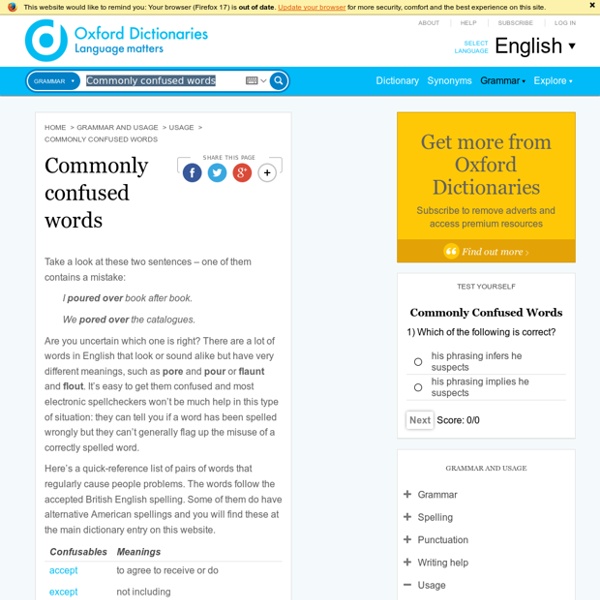



http://www.oxforddictionaries.com/words/commonly-confused-words
Quick Grammar Review Introduction "The complexities of English are such that the authorities themselves often stumble." — Bill Bryson, The Mother Tongue The Best Books of 2014 We asked some of our contributors for their favorite books they read this year. (Most listed new books, but a few picked older favorites or ones that will come out in the new year.) I was riveted by Martin Amis’s “The Zone of Interest,” with its daring projection into the mind and “heart” of a character (Paul Doll, the commandant of a Nazi concentration camp) who, like Nabokov’s Kinbote, is a tour de force of crazed self-delusion. I just wish the whole book was in Doll’s voice, with his eruptions of unintentional humor, swathes of bathetic self-pity, and moments of blasé horror: he may have, at one point, killed a small girl prisoner who reaches for his hand, but it’s typical of Amis’s artfully elliptical method that I can’t be sure; I kept wincingly rereading the passage, as if through my fingers, trying to figure out what happened but not wanting to.
Confusing Words and Homonyms Letter A - B - C - D - E - F - G - H - I - J - K - L - M - N - O - P - Q - R - S - T - U - V - W - X - Y - Z Many words in English sound or look alike, causing confusion and not a few headaches. This section lists some of these words, and other troublemakers. a.m., p.m. Word Usage Tips - tips on correct word usage - Choice of words Be careful with the choices of words. Most words are loaded with political, social, historical, aesthetic, or moral values. essay format A Basic Essay Format A good way to approach an essay is to envision it as a Five Part project. An essay is made up of the Introduction, Three main points (the body), and the Conclusion. So it looks like this: I. Introduction II.
Brainstorming What this handout is about This handout discusses techniques that will help you start writing a paper and continue writing through the challenges of the revising process. Brainstorming can help you choose a topic, develop an approach to a topic, or deepen your understanding of the topic’s potential. Passive Voice What this handout is about This handout will help you understand what the passive voice is, why many professors and writing instructors frown upon it, and how you can revise your paper to achieve greater clarity. Some things here may surprise you. We hope this handout will help you to understand the passive voice and allow you to make more informed choices as you write.
The Passive Voice Passive and Active Voices Verbs are also said to be either active (The executive committee approved the new policy) or passive (The new policy was approved by the executive committee) in voice. In the active voice, the subject and verb relationship is straightforward: the subject is a be-er or a do-er and the verb moves the sentence along. In the passive voice, the subject of the sentence is neither a do-er or a be-er, but is acted upon by some other agent or by something unnamed (The new policy was approved). Computerized grammar checkers can pick out a passive voice construction from miles away and ask you to revise it to a more active construction. There is nothing inherently wrong with the passive voice, but if you can say the same thing in the active mode, do so (see exceptions below).
Clear, Concise Sentences: Use the active voice At the heart of every good sentence is a strong, precise verb; the converse is true as well--at the core of most confusing, awkward, or wordy sentences lies a weak verb. Try to use the active voice whenever possible. Active vs. passive voice In a sentence written in the active voice, the subject of sentence performs the action. Voice: Active and Passive Active voice In most English sentences with an action verb, the subject performs the action denoted by the verb. These examples show that the subject is doing the verb's action.
Tips & Tools: Quick reference tips Readers prefer active voice sentences, and we should try to use the active voice in most of our business writing to communicate our message most effectively. Active voice clearly identifies the action and who is performing that action. Unfortunately, much of government writing is in the passive voice, giving documents a wordy, bureaucratic tone. Over time, writing in the passive voice simply becomes a habit, one we should all work to change. What is active/passive voice?
Grammar Handbook « Writers Workshop: Writer Resources « The Center for Writing Studies, Illinois The voice of a verb tells whether the subject of the sentence performs or receives the action. In English there are two voices: active and passive. Active Voice In active voice, the subject performs the action expressed by the verb: